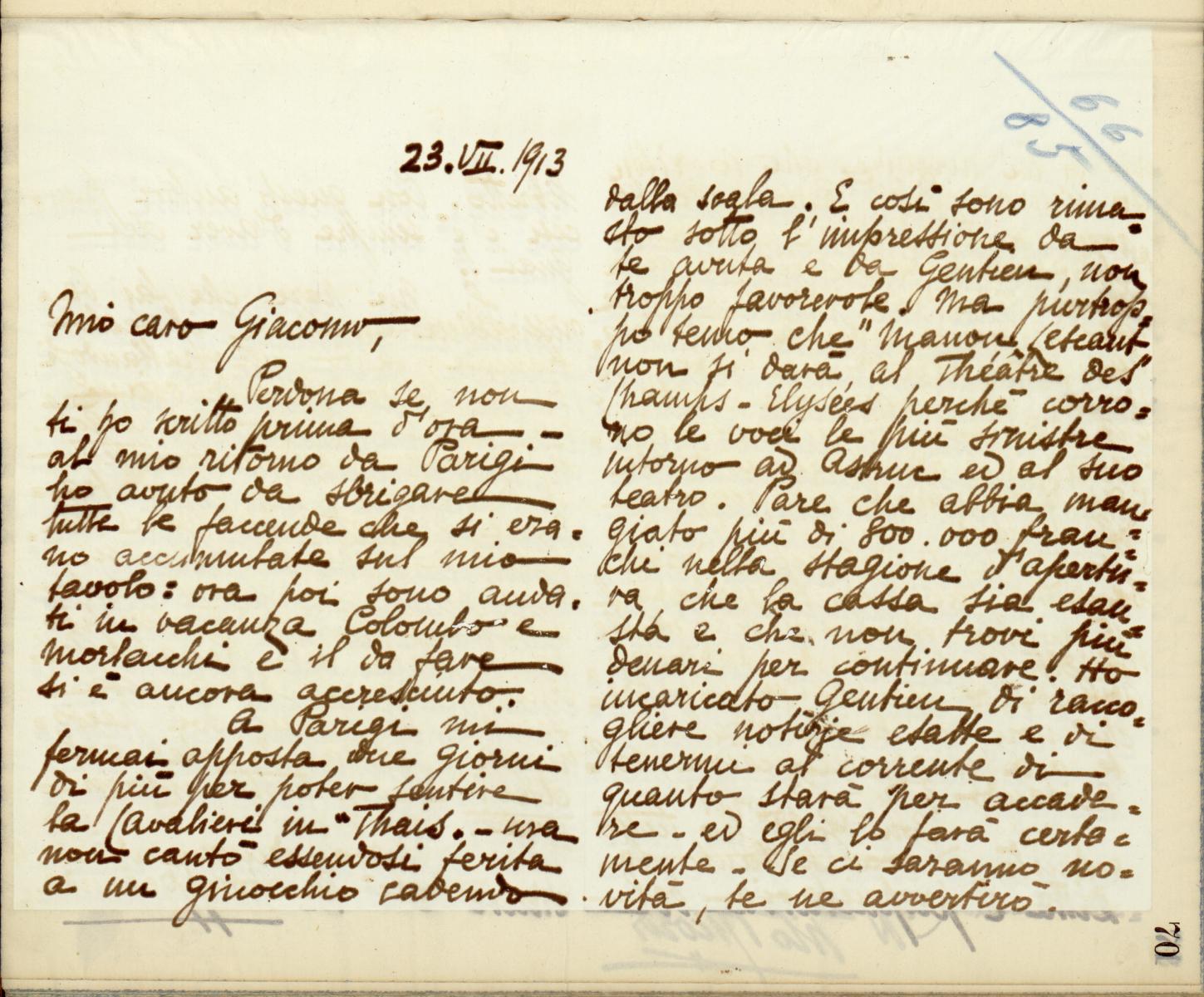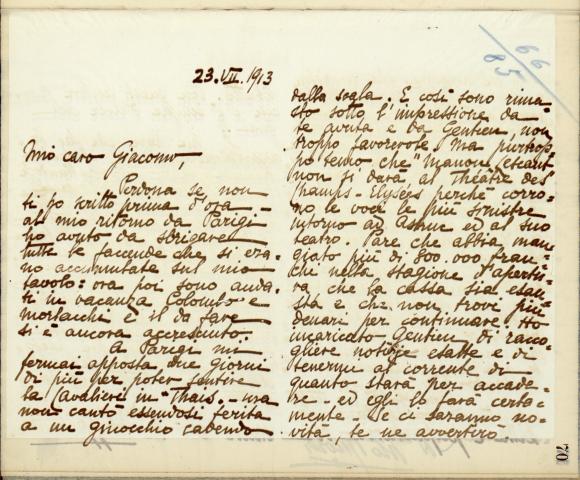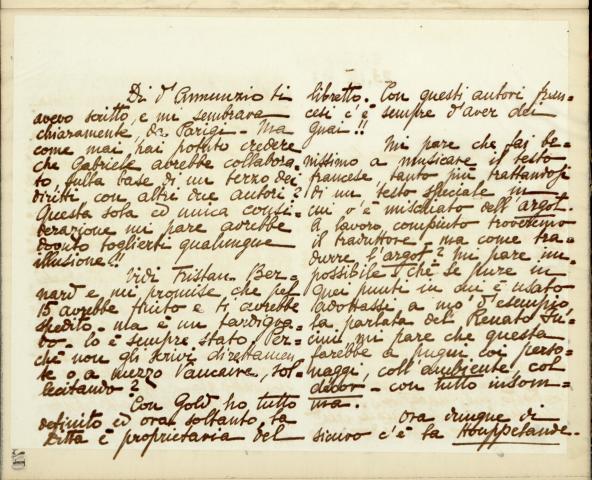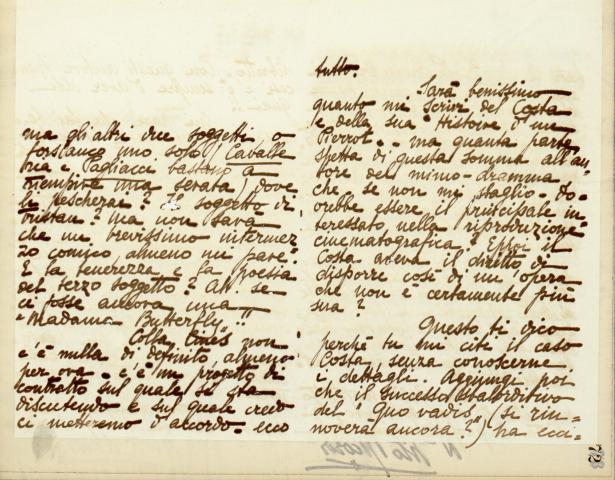Contenuto / Corrispondenza
Lettera di Tito II Ricordi a Giacomo Puccini
23 Luglio 1913
Manon Lescaut, Tabarro, Il, Madama Butterfly
Théâtre des Champs-Elysées
Milano
Ricordi Tito II (mittente)
Puccini Giacomo (destinatario)
Gentien Paul (soggetto menzionato)
Cavalieri Lina (soggetto menzionato)
Colombo Alfredo (soggetto menzionato)
Morlacchi Armanno (soggetto menzionato)
Bernard Tristan (soggetto menzionato)
Vaucaire Maurice (soggetto menzionato)
D'Annunzio Gabriele (soggetto menzionato)
Fucini Renato (soggetto menzionato)
Costa (soggetto menzionato)
Trascrizione
23.VII.1913
My dear Giacomo,
Forgive me for not having written to you before now — once I returned from Paris I had to dispense with all of the business that had accumulated on my desk; and now that Colombo and Morlacchi have gone on vacation, there is even more to do.
I extended my stay in Paris for two extra days in order to hear Cavalieri in "Thais" — but she did not sing because she had fallen from a ladder and hurt her knee, so I'm left with your impression and that of Gentien, neither of which is particularly favorable. But unfortunately I'm afraid that [in any case] "Manon Lescaut" will not play at the Théatre des Champs-Elysées, because there are dark rumors circulating about Astruc and his theatre. Word has it that the opening season cost more than 800,000 francs, that his coffers are empty and no money can be found to go on. I've asked Gentien to gather the facts and to keep me abreast of what is about to happen — and I've no doubt he will do exactly that. If there is any news of note, I will let you know.
I wrote you from Paris about D'Annunzio, and I thought I was clear. But whatever made you think Gabriele would have collaborated for a third of the rights with two other authors? This consideration alone should have been enough to dispel any such illusion!!
I saw Tristan Bernard and he promised me that he would have finished by the 15th and sent it to you — but he is slower than a snail — he's always been that way. Why don't you write to him directly or through Vaucaire to pry something out of him?
I have made definitive arrangements with Gold, and now our Company finally owns the libretto. Dealing with these French authors always involves so many problems!!
I think your decision to set the French text is quite wise, all the more so since it's a special text with argot mixed in. After the work is done we will find the translator — but how to translate the argot? It seems impossible to me — considering that even if one were to adopt, by way of example, the style of Renato Fucini in those places where it is used, it seems this would be at odds with the characters, with the setting, with the décor — with everything, in a word.
So at this point Houppelande is a sure thing — but for the other two subjects, or perhaps even just one (Cavalleria and Pagliacci are enough to fill an evening), where will you go casting your net? The subject of Tristan? But that would be nothing more than a mere wisp of a comic intermezzo, at least as it seems to me. And the tenderness and poetry of the third subject? Ah, if only there were another "Madama Butterfly"!!
There is nothing definite with the [Società Italiana] Cines, at least for now — there's a project for a contract being discussed and I think we'll reach an agreement — that's it in a nutshell.
What you've written me about Costa and his "Histoire d'un Pierrot" is all well and good — but how much of that figure goes to the author of the pantomime, who — if I'm not mistaken — should be the one primarily concerned with any cinematic reproduction? For that matter, did Costa have the right to make such an arrangement for a work that is certainly no longer his?
I'm telling you this because you've brought up the case of Costa without knowing the details. Consider also that the astonishing success of "Quo vadis" (will that ever happen again?) has set everyone's imagination on fire, and that right now the film companies are waging a ruthless war with one another by wielding offers and contracts with no guarantee of their eventual effective worth, given that all this is new and unsupported by any legislation or definitive court decisions.
Should I, in the name of my Company, sign any contracts, I will do so with all due caution — and I will be inspired by those same principles that have always guided our Firm when dealing with the emergence of new areas of inquiry involving the protection of copyrights.
Let me know how you and your work are getting on
yours fondly
Tito Ricordi




